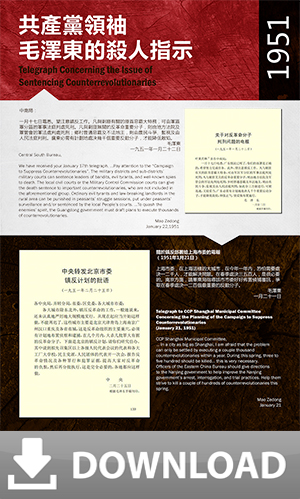今天,我们在社会主义文化大革命高潮中,迎接“六一”国际儿童节。我们向全国少年儿童致以节日的祝贺,向辛勤抚育和以革命精神教育孩子的教师、少先队辅导员、少年儿童工作者、保育工作者和革命的家长们,致以热忱的慰问和敬意。
...
 Welcome to our digitized archives! We hope the documents in this digitized collection offers you a productive research opportunity. For the convenience of researchers, each document in this collection is arranged next to its English translation. Although limited in size, this collection contains many documents that are still sensitive today. Accordingly, this collection is the result of more than twenty years of often dangerous efforts to procure information on historical human rights abuses in China. Although it is our hope to one day digitize our entire archives, at the moment we can only digitize a select number of documents. The documents in this collection were chosen by LRF staff for digitization because of their fundamental importance in understanding the Laogai System and its development over time. Below you will find a brief overview of the contents in this collection.
Welcome to our digitized archives! We hope the documents in this digitized collection offers you a productive research opportunity. For the convenience of researchers, each document in this collection is arranged next to its English translation. Although limited in size, this collection contains many documents that are still sensitive today. Accordingly, this collection is the result of more than twenty years of often dangerous efforts to procure information on historical human rights abuses in China. Although it is our hope to one day digitize our entire archives, at the moment we can only digitize a select number of documents. The documents in this collection were chosen by LRF staff for digitization because of their fundamental importance in understanding the Laogai System and its development over time. Below you will find a brief overview of the contents in this collection.
Most of our digitized collection speaks to exactly how the Chinese Communist Party established the Laogai System and what groups of people the Laogai System targeted. Given that the Laogai System matured and solidified during the 1950s, much of our collection originates from that decade. Take, for example, the Central Committee’s May 1951 directive titled “Third National Public Security Conference’s Resolution to Issues of Organizing National Laogai Prisoners.” This directive details the structure and rationale of the reform through labor system and therefore informed subsequent directives. Yet another directive, the Standing Committee’s August 1957 “Laodong Jiaoyang (Laojiao) Reeducation Through Labor,” details the structure and rationale of the reeducation through labor system.
Our digitized collection also speaks to how the Laogai System transformed during different eras of Chinese history. Our documents from the Cultural Revolution, for example, demonstrate the erosion of a structured and hierarchical Laogai System as China devolved into quasi-anarchy. Conversely, our documents from the immediate post-Cultural Revolution era demonstrate a concerted effort on behalf of the Chinese Communist Party to reassert total control over the Laogai System.
In addition to the development and transformation of the Laogai System, our digitized collection also contains documents that speak to the persecution of specific activities or people. For example, “Exhibition of Incriminating Evidence against Counterrevolutionaries and Other Criminals,” which was compiled and printed for internal use by the Ministry of Public Security in October 1957, details the counterrevolutionary crimes of Catholic Bishop Kung Pin-Mei. Yet another document, written on March 22, 1973 by the Revolutionary Committee of Li County, details the punishment of Zhen Zechun.
In addition to the digitized collection embedded above that is a translated and downloadable PDF document, below you will find another digitized collection of select Chinese language documents from the Cultural Revolution that can be searched and filtered to simplify the research process.